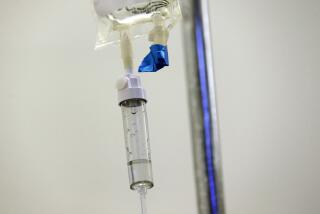Silicone Moratorium a Lifesaver? : FDA decision on implants is one that all should support
- Share via
The Food and Drug Administration did the right thing--the responsible thing--Monday in asking doctors temporarily to stop using silicone gel breast implants pending further investigation. Although FDA Commissioner David A. Kessler did not impose an outright ban on implants, he did fend off intense lobbying from some physicians and implant manufacturers by calling for the voluntary moratorium. By doing so, the FDA sent another welcome signal that the agency regards seriously its role as protector of the public’s health.
The advisory panel Kessler convened last fall to probe silicone implant safety was troubled by more than 2,500 reports of illnesses or injuries associated with the device. These have included hardening, leakage or rupture of the device and interference with mammography readings. Kessler was even more disturbed by information he received since the advisory panel finished its work. That new information includes reports from some medical specialists that there is an increasing number of autoimmune disorders such as arthritis and lupus among implant patients.
Kessler was, no doubt, troubled as well by the behavior of one silicone implant maker that the FDA accused last week of giving misleading information to women calling its hot line about their implants. Operators at Dow Corning Wright Co.’s Implant Information Center, the agency said, told anxious callers the implants were “100% safe,” and that “after 30 years of study conducted with patients, there have never been health problems with implants or silicone.” Under FDA order to stop making false statements, Dow has since altered its hot-line policy.
In 1976 the FDA gained specific legislative authority to approve medical devices for sale or use. Breast implants along with many other devices, including heart valves, that were first marketed before 1976 have been subjected to an FDA safety review on a device-by-device basis. That’s why the agency is now looking at implants.
Kessler believes that all women, even mastectomy patients, are best advised to wait a bit in the interest of safety. The FDA’s action may prevent the trickle of litigation over breast implants from becoming a flood. (A recent $7.34-million jury award against Dow Corning resulted from a lawsuit over an implant rupture.)
Kessler’s decision is in contrast with the FDA’s past reluctance to act in the face of mounting medical data concerning the dangers of the Dalkon Shield. The agency’s reluctance meant that hundreds of thousands of women who claimed they were injured by the intrauterine device had to sue.
Silicone implants eventually may get a clean bill of health; but until that’s known for sure, Kessler’s caution is welcome.
More than 2 million women have received silicone gel breast implants, and 150,000 of the devices are implanted annually. About 80% of the operations are for cosmetic purposes, the remainder for reconstruction after breast cancer surgery. The moratorium does not affect the use of saline implants, which are less common and are not believed to pose the same danger as silicone gel implants.
The American College of Plastic and Reconstructive Surgeons said it’s “disturbed” about the moratorium but will abide by Kessler’s decision. To retain the public’s trust, it has no choice.






